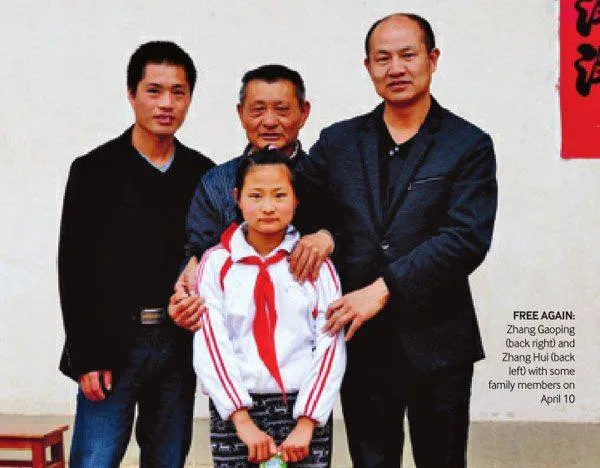Safeguarding the Innocent
On August 13, the Commission for Political and Legal Affairs of the Communist Party of China (CPC) Central Committee published an official paper laying out the guidelines for the prevention of false convictions.
The guidelines came in response to public cries for judicial fairness after the emergence of several prominent cases ending in false convictions. It is also the first attempt of the sort to be issued by Chinese authorities in order to prevent this kind of courtroom scandal.
“Recent events in the courts have brought unprecedented challenges to the system. It’s time to work toward implementing measures that will prevent further miscarriages of justice,” said Chen Weidong, a professor at the Law School of Beijingbased Renmin University of China.
According to him, the guidelines are a decent attempt by Chinese authorities to make headway,“These provisions did not come easily. It is the result of decades of experience and study in judicial practice,” Chen said.
Courtroom scandals
In recent years, a series of cases where the innocent were wrongfully sentenced to imprisonment or death have triggered public outrage in China. The latest two such cases were reported in east China’s Zhejiang Province.
On July 2, five men who served 17 years in prison after being wrongfully convicted for the murders of two taxi drivers in Hangzhou, the provincial capital, were acquitted of all charges.
In 1997, Chen Jianyang, Tian Weidong, Wang Jianping, Zhu Youping and Tian Xiaoping—all natives of Xiaoshan District—received either death sentences or life imprisonment during the trial by the Hangzhou Municipal Intermediate People’s Court for the murder and robbery of two separate taxi drivers in 1995.
All five appealed. Later, the Higher People’s Court of Zhejiang commuted the sentences of the three who had been sentenced to death. However, the court still upheld the guilty verdict and merely changed their sentence to the death penalty with two-year reprieves.
Fourteen years later, fingerprint evidence from one of the murder sites surfaced, leading police to arrest and charge Xiang Shengyuan, a Hangzhou native who pleaded guilty to killing taxi driver Xu Caihua on March 20, 1995, after arguing over a fare.
The evidence prompted the Higher People’s Court of Zhejiang to launch a review of the case earlier this year. The court found the convictions to be erroneous and in response overturned the sentences for all five men.
The five decided to bring charges against those that they consider responsible, including officers they claimed used torture and other illegal measures to force confessions out of them.
Another two men who had been wrongfully jailed for 10 years in Zhejiang, were acquitted of rape on March 26. New evidence surfaced showing the possibility of another suspect. The evidence presented during the initial trial was also found to be insufficient to support the original conviction.
On April 21, 2004, the Hangzhou Municipal Intermediate People’s Court sentenced Zhang Hui and his uncle Zhang Gaoping, both Zhejiang residents, for allegedly raping and killing 17-year-old Wang Dong. They received the death penalty and life imprisonment respectively.
Their sentences were later commuted to a death sentence with a two-year reprieve for the nephew and a 15-year prison term for the uncle in an appeal hearing conducted by the Higher People’s Court of Zhejiang on October 19, 2004.
The two men gave Wang a ride in their vehicle on the night of May 18, 2003, when they were transporting freight to Shanghai.
They dropped the girl off in Hangzhou at 1:50 a.m., and then continued on their way to Shanghai the next morning. Wang’s body was discovered unclothed and lifeless later that day.
The two men became the prime suspects and were detained a few days later, as they were the last people to have seen the girl alive. Both men claimed they were forced to confess after a lengthy interrogation.
On March 27, Tang Xuebing, a spokesman for the Higher People’s Court of Zhejiang, revealed at a news conference that police instructed inmates at the detention center to use violence to force the pair to confess. He also admitted that the false confessions given by them were used to convict them.
On March 28, Zhejiang police apologized via their website for the false conviction of the two men.
On May 17, the Higher People’s Court of Zhejiang ruled that Zhang Gaoping and his nephew would be paid 655,730 yuan ($107,015) each for their 3,596 days of imprisonment and a further 450,000 yuan ($73,440) each for psychological damages. A report from Xinhua News Agency released on August 17 said that the two men had refused the compensation and instead claimed a combined 7.02 million yuan ($1.15 million) from the state.
Extensive reform
Experts say that the newly released guidelines for preventing false convictions can better safeguard judicial independence, build credibility for the judicial system and help boost public trust.
The guidelines reiterate several legal principles, including preventing the punishment of people whose guilt cannot be determined absolutely, and that judges, procurators and police officers should bear personal responsibility for their roles in false convictions.
Asking judges, procurators and police officers to bear “lifelong responsibility” for their roles in false convictions would force them to be more meticulous and thorough when seeking proof for their cases, Chen Weidong said.
To prevent the extortion of confessions via torture, the guidelines reinforce the Criminal Procedural Law, which was amended last year and took effect on January 1. It states that interrogations and questioning should be conducted in purpose-built interrogation rooms at detention houses, with audio or video recordings to be taken during the entire interrogation procedure.
When investigative bodies transfer a case, all evidence should be transferred, regardless of whether it proves a suspect’s guilt or not.
The guidelines state that for cases in which there is not enough evidence to prove a suspect’s guilt beyond reasonable doubt, the court should avoid punishing or pronouncing the defendants not guilty, rather than issuing a judgment based on insufficient evidence.
The gpcGP6oWpXQxoh49VwMTzgA==uidelines also state that judicial bodies are to define rules and regulations in regards to false and incorrect judgments and establish mechanisms that allow authorities to continue to pursue those who are genuinely guilty in such cases.
“These guidelines are of great importance, as they are based on problems encountered during the correction of miscarriages of justice in recent years,” said Zhao Bingzhi, Dean of the College for Criminal Law Science at Beijing Normal University.
Although the guidelines are intended to reaffirm recent changes and revisions in the legal system, some of their wordings are completely new, according to Zhao.
They also call for changes to the current judicial appraisal system, which evaluates the performance of law enforcement personnel based on the number of criminal cases that have been solved and the number of suspects who have been detained or prosecuted.
“The current system has acted as a strong incentive for law enforcement authorities to use improper means to inflate arrest and conviction statistics. This in turn leads to increased numbers of false convictions,” Zhao said. “These guidelines may serve as an effective preventive measure if they are carried out properly,”
According to Li Jinxing, a criminal defense lawyer who has represented clients in four cases of false conviction since 2011, it usually takes only a month for a court to conclude a case, but several months for it to accept further appeals. “So there must be more false convictions out there that we do not know about,” Li said.

Compensation rule
Some legal experts suggest that the best way to make progress in preventing similar cases is to hold those who were in charge of the cases resulting in false convictions personally responsible and make them compensate victims.
“The purpose of the State Compensation Law is to reduce false conviction rates and prevent miscarriages of justice, but if concerned police officers and prosecutors do not suffer recourse for their mistakes, we will see no progress,” said Yi Shenghua, Director of the Criminal Department at the Beijing-based Yingke Law Firm.
Yi explained that currently, compensation is paid from the state’s finances, which means that compensation comes from taxpayer money.
In order to protect the legal rights of those who have been wrongfully convicted and also to promote proper judicial procedure, the Supreme People’s Court, China’s highest judicial body, has released an interpretation of the State Compensation Law, which will take effect on September 1.
The interpretation stipulates that the court must ensure that those who have been involved in the making of false convictions are not included in the compensation procedure in order to prevent potential manipulation.
The document also makes it clear that the court should review the entire case, including checking all the trial and execution documents, as well as investigating the staff related to the case if necessary. It adds that a hearing procedure between a compensation claimant and the court should be conducted only when the case is “complicated and controversial.”
“Standardizing the procedure for compensation is very important, as local courts have no guidelines to follow and some may forgo the payment of compensation owed,” said Hong Daode, a professor at the China University of Political Science and Law in Beijing.
In May, the Supreme People’s Procuratorate increased compensation standards to 182.35 yuan($29.75) per day for those whose personal rights had been infringed upon by authorities. This increase was based upon the increase in the average salary of state employees in 2012.
Liu Bojin, a renowned lawyer who represented Nie Shubin, who was executed in 1995 after an alleged false conviction, said that under the new interpretation, those who are convicted will have the chance to hire a lawyer and to go to the courts to ask for the amount of compensation that they are due.
“But the problem is that this interpretation fails to make the hearing a necessity in every case, but only in ‘complicated and controversial’ ones. This will become an excuse for many local courts to avoid holding hearings at all,” Liu added.
Jiang Ming’an, a law professor at Peking University, echoed Liu. “What the public wants to see is a better compensation system that will let wrongfully jailed people have a normal life and harsher punishments for those who wronged them,” he said.

